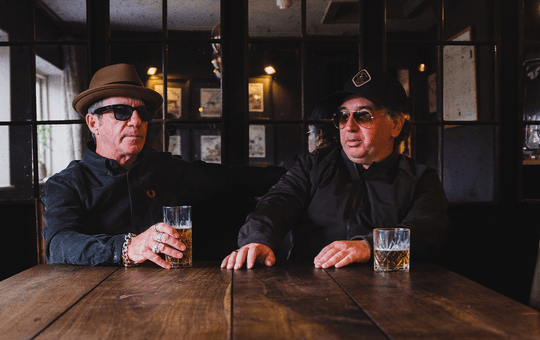Grouper interview: "Nihilism isn’t sustainable."
How often do you listen to an album as it is intended to be heard, from start to finish, giving it your full, undivided attention? Through headphones on the bus, in competition with the diesel engine, doesn’t count, nor playing it in the background as you bleed minutes into the internet. I mean just you and the music, sitting together, soaking one another in. I realised I hadn’t done this for quite some time as the final seconds of Grouper’s new-old album ‘The Man Who Died In His Boat’ Kranky faded away a few weeks ago. Of course, yes, I listen to albums in full all the time with a reviewer’s hat on, but you know what I mean: that unthinking-yet-not-thoughtless listening, that peaceful listening, that letting-be listening. It was just after Christmas in my room back in London, during a displaced moment, wondering what was next, and why and how. Nothing tragic or dramatic, just a little lost. ‘The Man Who Died In His Boat’ caught me – and it felt like a physical catching somehow – and for those 49 minutes I was free from distraction’s constant itch. Its simple, largely guitar-led songs felt almost like lullabies, but to wakefulness rather than sleep.
‘The Man Who Died In His Boat’ is new-old because it’s a collection of songs that Grouper’s Liz Harris recorded during the same period as her seminal 2008 album ‘Dragging A Dead Deer Up A Hill’ [Type]. In the five years since its release the Portland artist has turned her head from the guitar toward the more ambient-focused work of ‘A I A : Alien Observer’ and ‘A I A : Dream Loss’ [the pair released on Harris’ Yellow Electric label, 2011], and the almost-choral reverb of last year’s ‘Violet Replacement’ [Yellow Electric]. ‘The Man Who Died…’ is a look back, then, but a timely one; a chance to reflect on her radically different circumstances it transpires as we chat. I say chat, I mean email back and forth as this is how Harris prefers to conduct interviews. I get the feeling she’d rather not do them at all – this is one of only two she’s agreed to around this album – and yet the most personal of stories tumble out of her. Just as her music engulfs and enthrals, her openness is overwhelming and actually kind of humbling.
I first listened to ‘The Man Who Died In His Boat’ during a time I was feeling very alone, and it helped shift my thinking about that to a positive space. Do you, like writer Jay Griffiths in this recent essay, think that art and artists in the western world have taken on a shamanistic role?
“I was so sick with depression and solitude then that the feelings just spilled over of their own accord.” Grouper
Grouper: I’m glad to hear that. I had no perspective on what it was in the moment, but in retrospect I feel that the songs on ‘Man Who Died’ and ‘Dragging’ were a sort of outside force moving through me, a relieving/healing process, in the way that blood-letting is. I was so sick with depression and solitude then that the feelings just spilled over of their own accord. I’m thankful they found a way out, because there was a lot of poisonous thinking in my mind at the time. I think a lot about how helpful it can be to let an energy leave your own body, and return to you in an independent form, or costume. Sometimes there is no other way to receive a message. Shamanism talks about a sort of soul departure that happens when we encounter something too traumatic for us to handle. We do the safe thing and leave our own borders. It is safer sometimes to be outside of the body. Having respect for that energy as its own independent force, acknowledging it and listening to what it has to say, is one of the tools for inviting it back into the whole. You can’t just force it to return—when we let parts of ourselves go they develop their own personalities and lives. Sometimes they’ve already moved away and don’t want to come back. Psychologists talk about this coming and going, and so does almost every group involved in a form of ritual magic. There’s a darker side to it, because when part of you is gone there is room for other entities to hang out, but those heavy forces need to move through, too. The worst thing you can do when they show up is try to keep the gate closed.
Peace and pain are the words and feelings that the album bring to mind. How comfortably do these two seemingly opposites live together for you?
Grouper: Pain and friction are uncomfortable, but they are also a sign of growth. I’m happy for any emotion to present itself in a song, and to give it room and respect as such. It’s the moving through that is important. They turn a little wheel that helps me process my emotions (and hopefully help others do it too)— I still have trouble doing it from within my own body.
“I live in my body a lot more these days.” Grouper
I’m used to having opposite emotions sit closely together. If I’m not careful I see everything as either/or. It can be helpful for survival, but not for the everyday intricacies of healthy decision-making. I used to be far more comfortable with pain, with amputation, because even if I felt bad, at least it was familiar. I knew well how to react to it, how to live life with my guard up. What makes me comfortable has changed. I live in my body a lot more these days, which means paying attention to its needs in a more engaged way—going slow, resting, experiencing actual calm. Nihilism isn’t sustainable as a magic feather. I don’t want to be able to sleep at night because I don’t care about what’s happening tomorrow.
Patience was the other p-word I almost mentioned in my question about peace/pain, so I am glad you brought up the sense of ‘living in the body’ for which I think patience is an absolute requisite. Was there a turning point to getting the place you are now?
Grouper: Yes—an 8 hour long concert in Berlin last year that I played with my friend Jefre. I’d been having months of stress and insomnia build up. My body was starting to break down. I was drinking in order to sleep, trying to switch myself off rather than just slow down. I needed nothing but to rest, but had one of the longest bouts of travel I’d ever done booked ahead of me, three back to back trips with barely a break in between, of which this concert was the beginning. The show was meant to help people relax and sleep, and I hadn’t slept at all the entire night before, or multiple nights before it, that pattern extending back in a similar manner for months prior. I sat for 8 hours through the night fading slowly in and out on my mixer. The process was torturous on an ironic level that I don’t have to point out, but it did something to transform my sense of pace that has stayed with me since. It was like someone reached into the control panel of my brain and literally slowed me down, rooting me in my body in a way I couldn’t have planned. Being inside my body forced me to feel how badly it was doing, which gave me more incentive to initiate the process of trying to heal.
You have an incredible memory, it seems, with your ability to pinpoint transformative moments. Which temporal mode do you live in most: past, present or future?
Grouper: Just don’t ask me what I did yesterday or expect me to go to the right airport. I try for the present. Where I actually end up living probably arcs a nomadic/skittish arm across all three.
With regards to these songs having been written in the same period as ‘Dragging a Dead Deer Up A Hill’, do you have a sense of songs waiting for a story, or a home, when you write them or do you have a specific idea in mind with each?
Grouper: Both are exactly it. They are formed before I meet them. I put them in a room, where they talk to one another, and once the room feels full, I walk into the party and ask them to leave. My hope is that each one is open in a manner that conveys a specific story, and remains an open circuit, so that any new meaning that needs to course through (on its own or coming from a listener) can do so.
This reminds me of a dream I had when I was a kid, that ghosts were flying around my bedroom. The only way to calm the anxiety of their pace and intensity, was to focus my gaze on theirs, at which point they would fly straight through me. The sensation was overwhelming, but it felt much better than watching their random flight patterns and erratic behavior. I think about this dream a lot as a metaphor for what songs are to me. Some of the ghosts are mine, and some of them aren’t. It doesn’t always feel great to engage with them, but in the end I’m usually glad to have their company.
Do you feel it is important to reflect on learnings from each album – musically and/or emotionally – or to keep moving?
“I often picture releasing an album as trying to secretly sink a heavy object in a lake.” Grouper
Grouper: My instinct has always been to keep moving. I often picture releasing an album as trying to secretly sink a heavy object in a lake—find a quiet corner, gently slip it under the surface, watch the ripples for a moment, and steal away. The lessons come no matter whether I want them to. Sometimes they’re more poignant if I give them a wide berth. I do try to reflect on lessons related to the logistical aspects of releasing material—what did or didn’t work with this pressing plant, the merits of certain labels, etc.
Are there patterns to the way you write, or any rituals that have become part of your creative process?
Grouper: The only pattern I can think of is one I’m trying to shake. I sometimes won’t play casually unless I feel like recording, because I’m afraid I’ll write a new song. I have these old rules about how I can’t record new material until I’ve finished old material.
Are you working on new material now and, if so, does it follow the bodily sound lines of Violet Replacement?
Grouper: Yes. Two ambient collaborations will come out this year. Some of the sounds are similar to Violet. One with Lawrence English is pretty landscape-oriented, one with Jefre Cantu is all emotion and lack of sleep.
Kranky release Grouper’s new album ‘The Man Who Died In His Boat’ on 4th February 2013.














